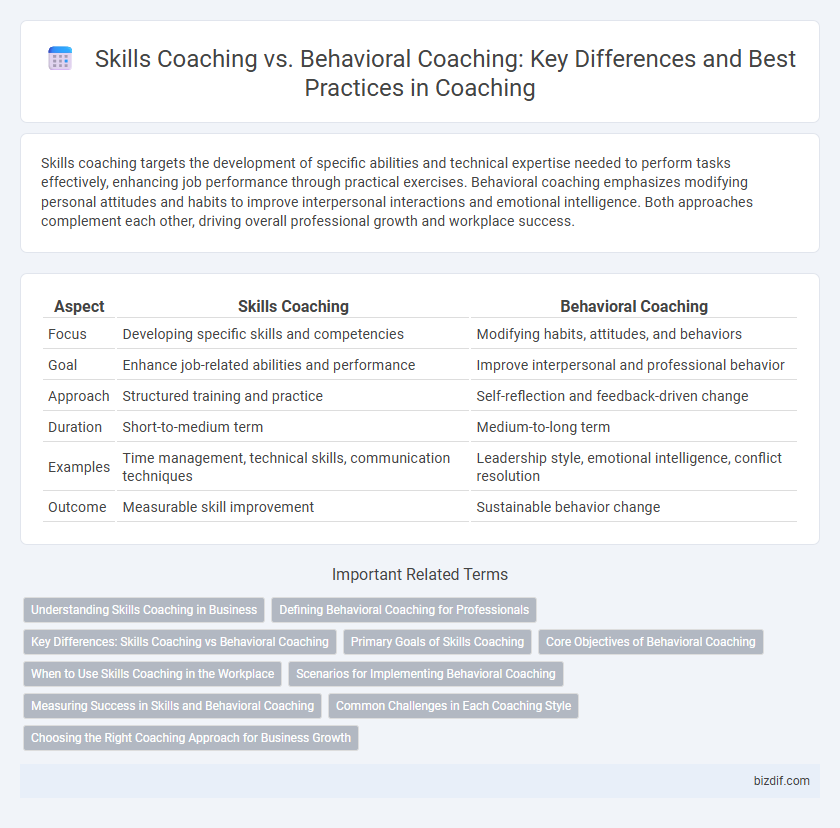Skills coaching targets the development of specific abilities and technical expertise needed to perform tasks effectively, enhancing job performance through practical exercises. Behavioral coaching emphasizes modifying personal attitudes and habits to improve interpersonal interactions and emotional intelligence. Both approaches complement each other, driving overall professional growth and workplace success.
Table of Comparison
| Aspect | Skills Coaching | Behavioral Coaching |
|---|---|---|
| Focus | Developing specific skills and competencies | Modifying habits, attitudes, and behaviors |
| Goal | Enhance job-related abilities and performance | Improve interpersonal and professional behavior |
| Approach | Structured training and practice | Self-reflection and feedback-driven change |
| Duration | Short-to-medium term | Medium-to-long term |
| Examples | Time management, technical skills, communication techniques | Leadership style, emotional intelligence, conflict resolution |
| Outcome | Measurable skill improvement | Sustainable behavior change |
Understanding Skills Coaching in Business
Skills coaching in business targets the development of specific competencies such as communication, leadership, and technical abilities to enhance employee performance and productivity. Unlike behavioral coaching, which addresses underlying attitudes and motivations, skills coaching provides practical techniques and actionable feedback to build expertise and achieve measurable results. This method supports organizational growth by aligning employee skills with business objectives and promoting continuous professional development.
Defining Behavioral Coaching for Professionals
Behavioral coaching for professionals centers on identifying and modifying specific behaviors that impact workplace performance and relationships, emphasizing actionable changes over abstract skill acquisition. This approach leverages behavioral psychology principles to enhance emotional intelligence, communication, and adaptability in professional settings. Compared to skills coaching, which targets technical or task-specific competencies, behavioral coaching drives sustainable improvement through mindset shifts and habit development.
Key Differences: Skills Coaching vs Behavioral Coaching
Skills coaching centers on developing specific competencies such as technical abilities or job-related tasks, ensuring measurable improvements in performance. Behavioral coaching targets mindset, attitudes, and habits, aiming to enhance emotional intelligence, communication, and leadership effectiveness. Both approaches contribute to professional growth but differ in focus: skills coaching hones practical expertise while behavioral coaching transforms underlying behavioral patterns.
Primary Goals of Skills Coaching
Skills coaching focuses on developing specific abilities and technical competencies essential for job performance and career advancement. The primary goals include enhancing proficiency, increasing productivity, and building expertise in targeted areas such as communication, leadership, or technical skills. This approach aims to equip individuals with measurable capabilities that directly impact their professional effectiveness.
Core Objectives of Behavioral Coaching
Behavioral coaching targets modifying specific actions and habits to improve performance and interpersonal interactions, prioritizing emotional intelligence, self-awareness, and adaptability. Core objectives include reinforcing positive behaviors, reducing counterproductive habits, and fostering mindset shifts that align with organizational values. This approach contrasts with skills coaching, which centers on developing technical competencies and task-specific abilities.
When to Use Skills Coaching in the Workplace
Skills coaching is ideal when employees need to develop specific technical abilities or job-related competencies to enhance performance and productivity. It focuses on measurable skill acquisition, such as mastering software tools, improving sales techniques, or refining presentation skills, making it highly effective for roles with defined skill requirements. Use skills coaching in the workplace during onboarding, role transitions, or when addressing performance gaps tied to particular tasks or technologies.
Scenarios for Implementing Behavioral Coaching
Behavioral coaching is most effective in scenarios requiring changes in specific actions, such as improving communication, leadership presence, or conflict resolution skills. It focuses on observable behaviors and provides real-time feedback to reinforce positive habits and diminish counterproductive practices. This approach is optimal in workplace environments where measurable performance improvements align closely with desired behavioral adjustments.
Measuring Success in Skills and Behavioral Coaching
Measuring success in skills coaching primarily relies on quantifiable improvements such as enhanced technical abilities, increased productivity, and achievement of specific performance metrics. Behavioral coaching success is evaluated through observable changes in interpersonal interactions, emotional regulation, and alignment with organizational values, often assessed via 360-degree feedback and self-reflection tools. Integrating data from objective performance indicators and subjective behavioral assessments provides a comprehensive view of coaching effectiveness.
Common Challenges in Each Coaching Style
Skills coaching often encounters challenges such as identifying specific skill gaps, maintaining learner motivation, and adapting techniques to diverse learning styles. Behavioral coaching faces obstacles in accurately diagnosing underlying behavioral patterns, overcoming resistance to change, and fostering sustained self-awareness. Both coaching styles require tailored strategies to effectively address these unique challenges and achieve meaningful development outcomes.
Choosing the Right Coaching Approach for Business Growth
Skills coaching targets specific competencies such as communication, technical abilities, and time management to enhance employee performance directly linked to business objectives. Behavioral coaching focuses on mindset, emotional intelligence, and interpersonal dynamics, fostering long-term cultural transformation and leadership effectiveness. Selecting the appropriate approach depends on the organization's growth goals, whether accelerating skill acquisition or driving sustainable behavior change.
Skills coaching vs behavioral coaching Infographic

 bizdif.com
bizdif.com